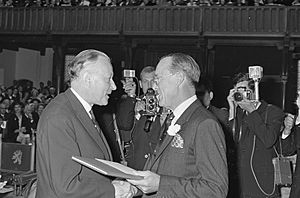René Huyghe facts for kids
Quick facts for kids
René Huyghe
|
|
|---|---|

Huyghe (Erasmus Prize, 1966)
|
|
| Born | 3 May 1906 |
| Died | 5 February 1997 (aged 90) 14th arrondissement of Paris, France
|
| Education | Lycée Michelet |
| Alma mater | University of Paris École du Louvre |
| Occupation | Writer Philosopher |
| Known for | Member of the Académie Française |
| Spouse(s) | Lydie Bouthet |
| Children | François-Bernard Huyghe |
René Huyghe (born May 3, 1906 – died February 5, 1997) was a French writer. He wrote about the history, psychology, and philosophy of art. He was also a curator at the famous Louvre Museum in Paris, starting in 1930. Later, he became a professor at the Collège de France. From 1960, he was a member of the Académie Française, a very important French institution. His son, François-Bernard Huyghe, also became a writer.
Contents
Life and Work of René Huyghe
Early Life and Education
René Huyghe studied philosophy and aesthetics (the study of beauty) at the Sorbonne. He also studied at the École du Louvre. In 1930, he became a curator in the painting department at the Louvre Museum. A curator is someone who manages and cares for a collection of art.
Rising Through the Ranks
By 1936, when he was only 30 years old, he became the chief curator. He also became a professor at the École du Louvre. René Huyghe started and edited art magazines like L’Amour de l’Art and Quadrige. He was one of the first people in France to make films about art. One of his films, Rubens, even won an award at the Venice Biennale. He also helped create the International Federation of Films on Art.
Protecting Art During World War II
During World War II, René Huyghe played a very important role. He helped the director of the French National Museums, Jacques Jaujard. Together, they organized the safe movement of the Louvre's paintings. They moved them to a safer area in unoccupied France. Huyghe was in charge of protecting these artworks until France was liberated.
Later Career and Achievements
In 1950, he was chosen to join the Collège de France. There, he held a special position studying the psychology of visual arts. In 1966, he received the Erasmus Prize in The Hague. This award recognizes people who have made important contributions to European culture.
In 1974, Huyghe became the director of the Musée Jacquemart-André. During this time, he met the Japanese philosopher Daisaku Ikeda. They wrote a book together called Dawn After Dark. This book was re-released in 2007.
René Huyghe created many TV shows about art for other countries. However, his TV projects were often not accepted by French TV officials. After a new president was elected in 1981, he was not allowed to appear on French TV.
Huyghe was also the president of a UNESCO committee. This committee worked to save the city of Venice. He also served on the Artistic Council of French Museums.
Awards and Recognition
René Huyghe received several high honors for his work:
- Grand Officer of the Legion of Honour
- Grand Cross of the National Order of Merit
- Commander of the Order of Leopold
Images for kids
See also
 In Spanish: René Huyghe para niños
In Spanish: René Huyghe para niños
 | Audre Lorde |
 | John Berry Meachum |
 | Ferdinand Lee Barnett |


